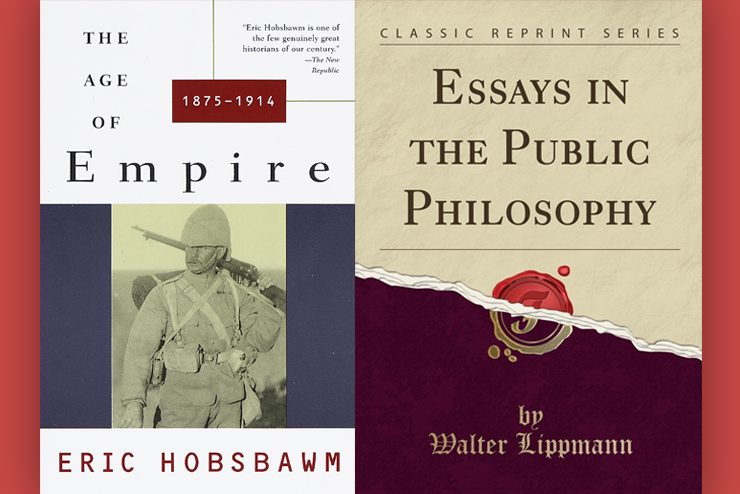Everyone to Bernie Sanders’ right gasped in 1994 when radical British historian Eric Hobsbawm argued that Communist regimes who murdered millions “would still have been worth backing” had there been a “chance of a new world being born in great suffering.” The diabolically deranged never connect maniacal theory to deadly results. We can’t psychoanalyze Hobsbawm, who died in 2012. But I haven’t found a better source for understanding leftism’s sheer malevolence than his 1987 book, The Age of Empire: 1875-1914.
This work, the third volume in Hobsbawm’s well-known tetralogy ranging from the French Revolution to 1991—when his delusions should have been swept into history’s dust bin—jams four decades of geopolitical complexity into the procrustean bed of imperialism. Hobsbawm’s erudition and wide-ranging, multilingual research shine throughout the series, which only adds to readers’ consternation as to how he could have been so wrong, for…ever. He mocks Catholicism’s alleged “total rejection of the ideology of reason and progress.” He dismisses the 19th century U.S. as “militantly imperialist,” well before it earned that calumny in Afghanistan and Iraq.
If you can ignore Hobsbawm’s hyperbole, in Empire he provides a factual thematic history of the period and its economic development, even as his reductive Marxist framework twists his analysis. The book’s real payoff comes from the intellectual vaccination it provides against doctrinal Marxism, ideological intolerance, and misanthropic evil.
Hobsbawm rehashes Marxian poppycock about history’s inevitability, a tenet of Karl Kautsky’s Marxist ratiocinations linking the “laws of history” to the laws of science. Hobsbawm holds that WWI didn’t arise from contingency and complexity. Instead, “Capitalism inevitably pushed the world” into it. Even AOC might blanch at Hobsbawm’s claim that “Standard Oil, Deutsche Bank, and the De Beers Corporation” defined capitalism’s “natural frontiers” as “the end of the universe.” Such exaggeration would be funny, if it hadn’t been so deadly.
Conservatives can immerse themselves in Adam Smith, Edmund Burke, Joseph DeMaistre, and other classical liberal and traditionalist icons yet still fail to grasp historical nuance. Let’s recall John Stuart Mill’s compelling defense of free speech before we engross ourselves further in our canon. “He who knows only his own side of the case knows little of that,” Mill warned. “Nor is it enough that he should hear the opinions of adversaries from his own teachers.” To truly understand our opponents’ arguments, we must “hear them from persons who actually believe them,” and read them “in their most plausible and persuasive form.”
Written by a Marxist zealot, Hobsbawm’s Age of Empire represents the Platonic form of ideological fanaticism’s pursuit of Utopia. What doesn’t persuade you makes you stronger. Reading Hobsbawm’s Empire is an idea “worth backing.”
—John Greenville
Walter Lippmann understood that liberal democracy stood in great peril. “There is a deep disorder in our society which comes not from the machinations of our enemies and from the adversities of the human condition but from within ourselves,” he wrote in Essays in the Public Philosophy (1955), a book he had worked on for 20 years. “We must renew the convictions from which our political morality springs.”
Lippmann was a believer in objective truth, and had clearly read Aristotle and Aquinas. He didn’t believe you just made things up and imposed them on others. That way lay despotism and anarchy, spreading their wings in the absence of constitutional order and waiting to land in Thomas Hobbes’s state of nature. “If what is good, what is right, what is true, is only what the individual ‘chooses’ to ‘invent,’ then we are outside the traditions of civility,” Lippmann wrote. “We are back in the war of all men against all men.”
I found particularly relevant, amid today’s awfulness, Lippmann’s stirring advocacy of free speech, not as we understand “free speech” in the era of Twitter hashtags, meaning the entitlement to shout and cuss and browbeat, maybe burn a U.S. flag, or even the small shop of an aspiring, tax-paying, law-abiding immigrant. Free speech, according to Lippmann, is the means of sorting out hard public questions through the civil interplay and exchange of ideas.
Lippmann adored the journalism profession throughout his life, reaping two Pulitzer Prizes from his labor. It is a field that, as presently constituted, would benefit immensely from careful study of his work.
I had not known of this book before I began a deeper study of natural law—the law written on the heart, propounded by such as Cicero and Saint Paul. Lippmann heartily embraced natural law: which was doubtless one reason Essays in the Public Philosophy met with a dismal reception among East Coast intellectuals. It tells me that the intellectuals, in their little self-love nest, understood rightly the threat posed by Walter Lippmann’s grasp of civilizational essentials.
—William Murchison

Leave a Reply